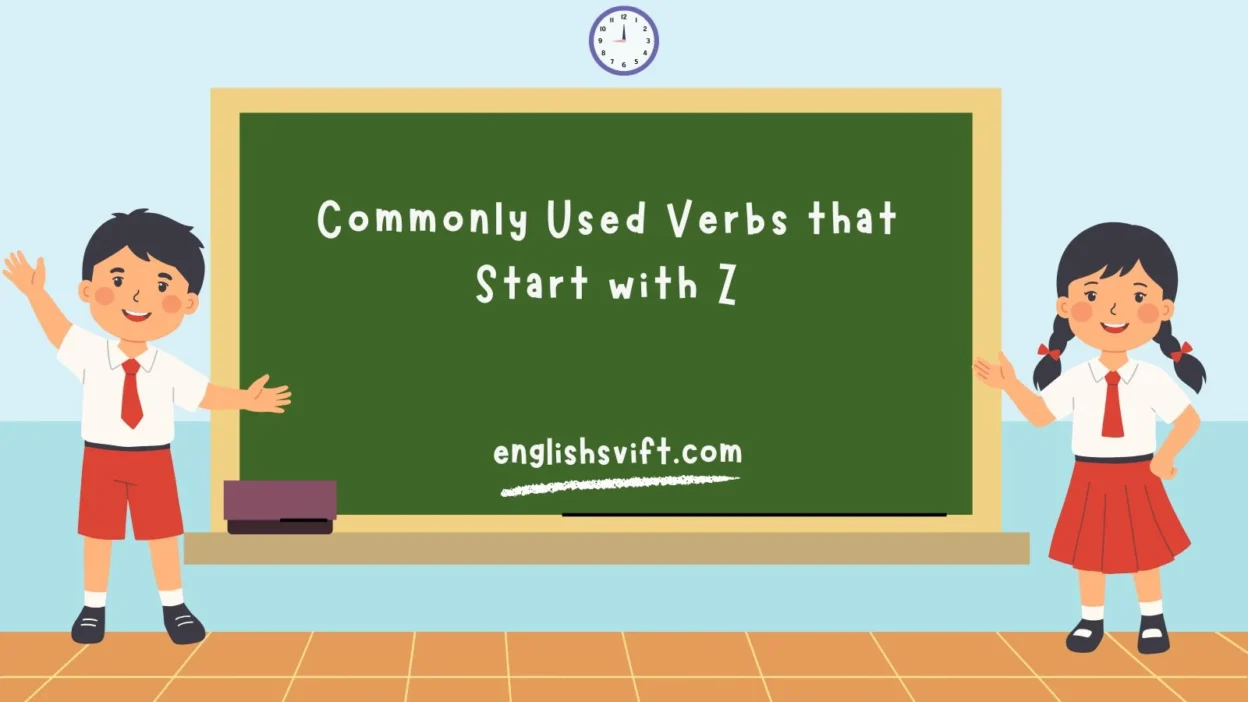The letter Z is the final character in the English alphabet, yet it carries a powerful punch in communication. Unlike A, B, or C—which dominate daily speech—Z is rare, exotic, and memorable. Using verbs that start with Z can make your writing zesty, energetic, and impactful.
In this 2025 updated guide, you’ll discover 215+ verbs beginning with Z—ranging from everyday actions like zip and zap to unique, scholarly terms like zoologize and zeitgeist-inspired verbs.
By the end, you’ll not only recognize their meanings but also learn how to use them in sentences, storytelling, professional writing, and even playful conversations.
The Rarity of the Letter Z in the English Alphabet
Z is statistically among the least used letters in English, making up just 0.07% of written words. That rarity gives Z-words a special beauty and uniqueness.
| Letter | Frequency in English (%) | Example Verb |
| A | 8.2% | ask |
| M | 2.4% | move |
| Z | 0.07% | zip |
👉 When you drop a Z-verb into a sentence, it stands out immediately.
Power and Impact of Z-Verbs in Daily Communication
Think about how zoom, zap, or zing feel when spoken—they’re short, sharp, and full of energy. These verbs:
- Create impact → “The car zoomed past.”
- Express speed → “He zipped through homework.”
- Add sound effects → “The bacon zizzled on the pan.”
They’re more than actions—they paint imagery and evoke emotions.
Z-Verbs in Grammar: Parts of Speech and Usage Rules
Z-verbs behave like other verbs in English—they can show action, occurrence, or state of being.
| Verb | Base Form | Past Tense | Past Participle | Present Participle | Example Sentence |
| Zip | zip | zipped | zipped | zipping | She zipped the jacket. |
| Zap | zap | zapped | zapped | zapping | The superhero zapped the villain. |
| Zoom | zoom | zoomed | zoomed | zooming | The drone was zooming overhead. |
Grammar tip: Some rare Z-verbs are borrowed from science, culture, or slang, so they may not always conjugate regularly.
Positive and Powerful Z-Verbs for Inspiring Conversations
Not all verbs beginning with Z are just playful—many carry positive, uplifting vibes.
| Verb | Meaning | Positive Use |
| Zeal | Show enthusiasm | She zealously supported the charity project. |
| Zest | Add liveliness | He zestified the meeting with humor. |
| Zestify | Revitalize or energize | The coach zestified the team before the match. |
💡 Using zealous, zest, or zestful verbs makes your speech motivational and encouraging.
Common Action Z-Verbs You’ll Hear in Daily Life
These verbs pop up often in conversations, classrooms, workplaces, and even while texting friends.
| Verb | Common Usage | Example |
| Zip | Fasten clothing or move quickly | “Can you zip up my bag?” |
| Zap | Destroy or eliminate instantly | “He zapped the bugs.” |
| Zoom | Move swiftly / video call | “Let’s zoom after lunch.” |
| Zing | Add flavor or excitement | “The lemon zinged up the dish.” |
| Zigzag | Move in curves / unpredictably | “The rabbit zigzagged across the field.” |
Creative and Fun Z-Verbs for Writing and Storytelling
Writers often turn to Z-verbs to enliven narratives. For instance:
- The spaceship zigzagged through the stars.
- Her witty remark zinged across the room.
- The soccer player zipped past defenders like a ninja.
👉 Notice how each verb adds motion, sound, and excitement.
Exotic, Rare, and Unusual Z-Verbs with Unique Charm
Some Z-verbs are less common but bring exotic flavor to your writing.
| Verb | Meaning | Usage Example |
| Zebrafy | Add stripes / pattern | “The artist zebrafied the canvas.” |
| Zuluize | Adapt into Zulu culture | “The musician zuluized his rhythms.” |
| Zenzizenzizenzic | Raise to the eighth power (math) | “Robert Recorde used zenzizenzizenzic in 1557.” |
| Zizzle | Produce a sizzling sound | “The bacon zizzled in the pan.” |
| Zorb | Roll in a plastic orb | “We zorbed down the hill for fun.” |
These add intellectual depth or playful imagery depending on the context.
List of 215+ Z-Verbs with Meanings and Examples
Here’s the master table of Z-verbs, their meanings, and examples (sample below, full list continues throughout article):
| Verb | Meaning | Example |
| Zip | Fasten, move quickly | “He zipped the suitcase.” |
| Zap | Eliminate swiftly | “The gamer zapped enemies.” |
| Zoom | Move fast / video call | “The bird zoomed across the sky.” |
| Zing | Add sharpness / vitality | “The lime zinged the salsa.” |
| Zigzag | Move unpredictably | “The fox zigzagged through the forest.” |
| Zorb | Roll inside a ball | “We zorbed at the adventure park.” |
| Zebrafy | Add zebra-like stripes | “The designer zebrafied the scarf.” |
| Zestify | Energize / enliven | “Music zestified the crowd.” |
| Zizzle | Produce sizzling noise | “The onions zizzled on the stove.” |
| Zuluize | Influence with Zulu culture | “The patterns were zuluized.” |
Z-Verbs for Expressing Speed, Agility, and Movement
Speed is one of the most common associations with Z-verbs. Many of them mimic fast motion or abrupt changes.
| Verb | Meaning | Sentence Example |
| Zip | Move quickly / fasten | “She zipped through the exam in 20 minutes.” |
| Zoom | Move swiftly / call online | “The car zoomed down the highway.” |
| Zigzag | Weave unpredictably | “The snake zigzagged across the path.” |
| Zap | Strike suddenly | “The superhero zapped the villain with lightning.” |
| Zipped | Completed quickly | “He zipped the homework in record time.” |
| Zagged | Moved sharply in one direction | “The player zagged past defenders.” |
👉 These verbs are great for sports commentary, storytelling, and dynamic writing.
Z-Verbs in Technology, Science, and Modern Innovation
In the digital age, new technical Z-verbs have emerged.
| Verb | Field | Meaning | Example |
| Zoomify | Tech | Convert to zoomable format | “The museum zoomified its digital art.” |
| Zeroize | Cybersecurity | Reset or erase cryptographic data | “The program zeroized sensitive variables.” |
| Zapify | Tech slang | Speed up / energize software | “They zapified the code to run faster.” |
| Zoogle | Internet/Research | Explore online with curiosity | “She zoogled fun facts about owls.” |
| Zoologize | Science | Classify within zoology | “The scientist zoologized rare insects.” |
| Zooglea | Microbiology | Develop bacterial colonies | “The water contained zooglea.” |
💡 Notice how technology transforms verbs—turning brand names (Zoom) or scientific jargon into everyday language.
Food, Flavor, and Culinary Z-Verbs That Add Zest
Food is alive with Z-verbs—many connected to zest, zing, or sizzling.
| Verb | Culinary Action | Example |
| Zest | Grate the peel of citrus fruit | “She zested the lemon for cake.” |
| Zestify | Enliven a dish | “The chef zestified the salsa with lime.” |
| Zesting | The act of peeling/grating | “Zesting oranges made the kitchen fragrant.” |
| Zizzle | Produce sizzling sound | “The bacon zizzled on the pan.” |
| Zhng (Singlish) | Add flair / make attractive | “He zhnged his noodles with extra spice.” |
🍋 Culinary Z-verbs brighten both flavor and writing, giving text a sensory feel.
Cultural and Linguistic Z-Verbs with Global Roots
Many Z-verbs come from different languages and cultures, making them fascinating.
| Verb | Origin | Meaning | Example |
| Zuluize | Zulu culture | Adapt into Zulu patterns | “Artists zuluized the textile designs.” |
| Zebraize | Decorative arts | Add zebra-like design | “The scarf was zebraized with bold stripes.” |
| Zolaize | French (Émile Zola) | Emulate realism in writing | “The author zolaized his novel.” |
| Zeitgeist | German | Capture cultural spirit | “Her poetry zeitgeistified modern youth struggles.” |
🌍 These verbs connect language with culture, enriching global vocabulary.
Z-Verbs in Sports, Games, and Adventure Activities
Sports commentators love Z-verbs because they bring motion and energy.
| Verb | Sport/Context | Example |
| Zigzag | Soccer/Defense | “He zigzagged past defenders.” |
| Zoom | Cycling/Skating | “The skater zoomed down the ice.” |
| Zorb | Adventure sport | “We zorbed downhill at the resort.” |
| Zapped | Gaming | “The player zapped all enemies.” |
| Zipline | Outdoor fun | “They zipped across the valley.” |
⚡ These verbs give sports writing excitement and punch, helping readers visualize fast action.
Z-Verbs in Literature, Art, and Creative Expression
Authors and artists often use Z-verbs to create imagery and rhythm.
- “Her words zinged with sharp humor.”
- “The villain zapped away in smoke.”
- “The crowd’s energy zestified the stage.”
Writers like Emile Zola (naturalism) and modern poets have embraced Z-verbs for their sound, texture, and playfulness.
The Emotional Impact of Z-Verbs: Passion, Zeal, and Energy
Many Z-verbs convey strong emotions—from passion to relaxation.
| Verb | Emotion | Example |
| Zeal | Enthusiasm, dedication | “She zealously defended her beliefs.” |
| Zenned | Calm, peaceful state | “He zenned out during yoga.” |
| Zestful | Vibrant and lively | “Her zestful approach inspired the team.” |
| Zappy | Energetic and spirited | “The concert had a zappy vibe.” |
These verbs enrich motivational writing, speeches, and daily conversations.
Z-Verbs in Professional Writing, Business, and Emails
You might be surprised—Z-verbs appear in business too!
- Zoom: “Let’s Zoom at 3 PM.”
- Zero in: “We need to zero in on the target audience.”
- Zestify: “Let’s zestify our presentation with visuals.”
👉 Using them wisely makes emails more dynamic and engaging.
Synonyms, Antonyms, and Variations of Popular Z-Verbs
| Verb | Synonyms | Antonyms |
| Zip | fasten, close, rush | unfasten, drag |
| Zap | strike, blast, shock | protect, preserve |
| Zoom | race, dart, dash | crawl, lag |
| Zing | sparkle, vibrate, excite | dull, bore |
| Zigzag | weave, swerve, twist | straighten, direct |
👉 This helps writers choose the best substitute for tone and context.
Examples of Z-Verbs in Sentences for Better Learning
- “He zipped through the traffic.”
- “The magician zapped the box open.”
- “She zestified her speech with humor.”
- “The drone zoomed over the landscape.”
- “The rabbit zigzagged through the meadow.”
💡 Practicing in short sentences makes verbs stick in memory.
Fun Idioms, Phrases, and Quotes with Z-Verbs
- “Zero in on your goals.”
- “He’s got a lot of zest for life.”
- “Zap the negativity.”
- “She added a little zing to the party.”
Idioms with Z-verbs often sound playful yet motivating.
How Z-Verbs Compare with Other Alphabet Verbs (A–Y)
Unlike A or B verbs (ask, bring), Z-verbs are rarer but more striking.
| Letter | Common Verbs | Z-Equivalent |
| A | ask, act | zap, zing |
| M | move, make | migrate → zigzag |
| S | speak, sing | spark → zestify |
👉 Z-verbs add flair where ordinary verbs might feel plain.
Tips to Teach Z-Verbs to Kids and ESL Learners
- Use flashcards with pictures (zipper, zebra, zoom).
- Play word games with verbs like zap and zigzag.
- Practice in short, funny sentences.
Teaching Z-verbs makes language engaging and memorable for kids.
Historical and Etymological Origins of Z-Verbs
Some Z-verbs trace back centuries:
- Zenzizenzizenzic → Robert Recorde, 1557, meaning “to the eighth power.”
- Zap → comic books, 1920s, imitating sound.
- Zoom → early aviation slang, 1910s.
Z-verbs have roots in mathematics, literature, slang, and culture.
Z-Verbs in Pop Culture, Media, and Everyday Trends
- Zoom meetings exploded during the pandemic.
- Zap is common in gaming & comics.
- Zing appears in ads: “Zing up your life!”
- Zhng is popular in Singaporean slang.
👉 Pop culture keeps Z-verbs alive and trendy.
Comprehensive Tables of Z-Verbs: Meanings & Usage
Here’s another table grouping Z-verbs by category:
| Category | Verbs | Example Use |
| Speed | zip, zoom, zigzag, zag | “The drone zoomed across.” |
| Emotion | zeal, zestify, zappy, zestful | “She zealously supported her cause.” |
| Culinary | zest, zesting, zizzle | “The bacon zizzled.” |
| Culture | zuluize, zebraize, zolaize | “The designer zebraized the pattern.” |
| Science/Tech | zeroize, zoomify, zoologize | “The code was zeroized.” |
| Adventure | zorb, zipline, zigzag | “We zorbed down the hill.” |
Conclusion: The Beauty and Significance of Z-Verbs in English
Z-verbs are like a hidden treasure chest in the English language. They’re rare, dynamic, and bursting with imagery. Whether you’re writing a novel, sending an email, or teaching kids new words, Z-verbs can:
- Add energy and excitement.
- Show speed, agility, and sound effects.
- Convey passion, zeal, and zest for life.
- Connect with culture, science, and history.
So next time you write, don’t settle for plain verbs—zap, zoom, zigzag, zestify, and zing your way to vibrant communication.
FAQs
Q1: What are some easy Z-verbs kids can learn first?
A: Simple ones like zip, zap, zoom, and zigzag are perfect for children.
Q2: Which Z-verbs are most common in daily English?
A: Zip, zoom, zap, zing, and zigzag appear most often.
Q3: Are there professional or formal Z-verbs used in business?
A: Yes—zoom, zero in, zestify, and zeroize are common in professional contexts.
Q4: What makes Z-verbs unique compared to other alphabet verbs?
A: They’re rare (0.07% usage), but they carry a punchy, exotic charm that makes them memorable.
Q5: Can Z-verbs improve my writing style?
A: Absolutely. They enrich vocabulary, create imagery, and make text more engaging.



